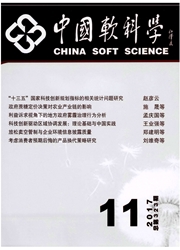

 中文摘要:
中文摘要:
随着"婴儿潮"期出生人口的加速老龄化,80、90后新生代劳动力渐成我国的主体劳动力。然而,新生代劳动力择业行为具有典型的"去制造业化"、"高端化"和"服务化"等特征,这将对我国制造业发展产生深远影响。运用1995-2014年我国新生代劳动力供给和制造业细分行业数据,通过构建VAR模型,对新生代劳动力供给变化影响制造业升级的效应进行实证检验,结果发现:新生代劳动力供给数量与质量变化对低端制造业的影响显著为负,且系数较大;对中端和高端制造业的影响显著为正。这说明,随着新生代劳动力供给数量的变化和平均受教育年限的增加,已使低端制造业失去了传统比较优势,但却为中高端制造业的较快发展提供了良好条件。因此,要顺应新生代劳动力供给变化,通过政策顺势促推制造业向和新生代劳动力供给变化相协调的产业高端升级。
 英文摘要:
英文摘要:
With the accelerating aging of the population who were born in the period of "baby boom", the new generation labor of 80s and 90s have been gradually becoming the body of the labor market of China. However, the new generation labor's job-seeking behavior has appeared the typical "non-manufacturing" characteristics, which should bring in a profound impact for the development of manufacturing. Based on the 1995-2014 year's datum of the quantity and quality of new generation labor supply, and technology, capital and sub-sectors of manufacturing, by constructing the VAR model, this paper makes an empirical analysis on the effectiveness of the new generation labors supply change on Manufacturing upgrade. We find that the impact of a change of the new generation labor supply quantity and quality on low-end manufacturing is significantly negative and the coefficient is large; the impact on the mid-range and high-end manufacturing are significantly positive. The conclusion shows that with the reducing of the number of the new generation labor supply and by the increasing length of the average educational years of the new generation labor, the low-end manufacturing has lost its traditional comparative advantage, but the mid-range and high-end manufacturing would have a good condition for a rapid development. Therefore, we should comply with the new generation labor supply change, and homeopathy push manufacturing to upgrade, and make its direction of development coordinated with the Cenozoic labor supply changes by carrying out new policies.
 同期刊论文项目
同期刊论文项目
 同项目期刊论文
同项目期刊论文
 期刊信息
期刊信息
